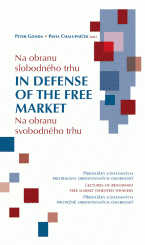 |
|||||||
| INSTITUTE | CONSERVATISM | M.R.STEFANIK |
| LECTURES
|
[16.06.2008, Victoria Curzon-Price, LECTURES]
The Treaty of Lisbon, still undergoing ratification, is designed to contribute to resolving this dilemma. It will streamline decision-making in the EU, which according to experts has become too cumbersome, inequitable and too heavily loaded in favour of small members. The Lisbon Treaty also enlarges the scope of what matters may become the object of decisions according to this new rule, notably to justice and home affairs, social questions and human rights. This is designed to allow the EU to act in matters of priority concern to citizens, and improve the EU’s legitimacy in the eyes of the people. In deciding on the division of competencies between the EU and Member States, the Lisbon Treaty binds the EU to respect the principle of subsidiarity. However, decisions on what should be decided upon at EU level rest with the EU itself. The historical record of the EU show that it favours “positive integration” over institutional diversity for three reasons: (1) it has a mission to “build” Europe, (2) it wishes to avoid distortions of competition by establishing a “level playing field” and (3) it fears a “race to the bottom” as a result of institutional competition. But the “level playing field” argument is false (if competitive conditions were equalized, the basis of trade would disappear!) and the case of Switzerland shows that the fear of a “race to the bottom” is groundless. Switzerland is a Confederation of 26 sovereign states which have delegated very few tasks to the Federal government, and where institutional competition between the Cantons is lively. The Swiss Confederation reached its present shape in 1848, combining economic and monetary union with a high degree of fiscal and regulatory decentralization. A recent burst of fiscal competition, initiated in 2004 by Schaffhausen, has led to a round of tax cutting at the higher end of personal incomes, abolition of death duties and lower corporate taxes in many cantons. However, the end result is not zero, but lower, tax rates and more careful government spending. There is a race, but not to the bottom, and the end result is to make Switzerland an attractive place in which to invest and live. There is a possible lesson for the EU in this example. The European Union is suffering from a lack of democratic legitimacy. It is seen to be taking on an ever wider role in matters affecting people’s daily lives, yet its institutions are far from democratic. The Swiss example shows that most decisions could without danger be restored to democratically elected member states’ governments. The EU would lose in “unity”, but it would gain in diversity and legitimacy. It would also benefit, as has Switzerland, from institutional competition and would rapidly become a zone for institutional innovation, diversity and efficiency. Presentation:
The lecture was presented at the Conservative Economic Quarterly Lecture Series (CEQLS) held by the Conservative Institute of M. R. ©tefánik in Bratislava on June 12, 2008. More information is available here. |
 English | Slovak
English | Slovak
This website was created also thanks to funding granted by The Trust
for Civil Society in Central and Eastern Europe.
Website powered by Metafox CMS from Platon Group.
|
Conservative Institute of M. R. Stefanik |
Tel.:
+421 258 100 188 |

 The European Union has yet to resolve the question: “how much unity?” and “how much diversity?” With every successive enlargement, diversity increases, rendering more challenging the stated objective to achieve “ever closer union among the peoples of Europe”.
The European Union has yet to resolve the question: “how much unity?” and “how much diversity?” With every successive enlargement, diversity increases, rendering more challenging the stated objective to achieve “ever closer union among the peoples of Europe”.





